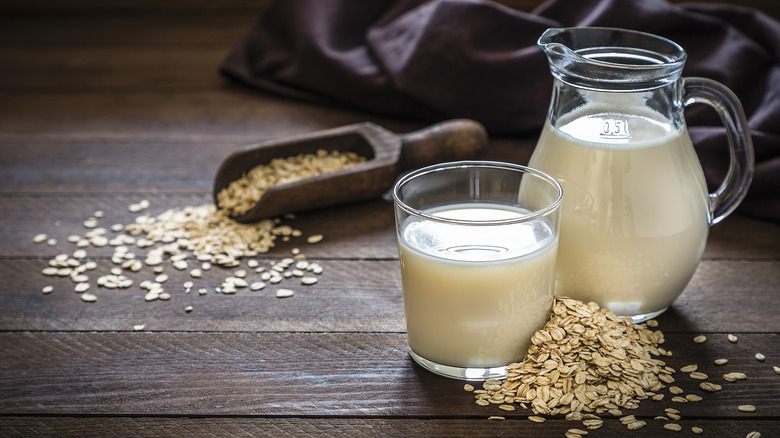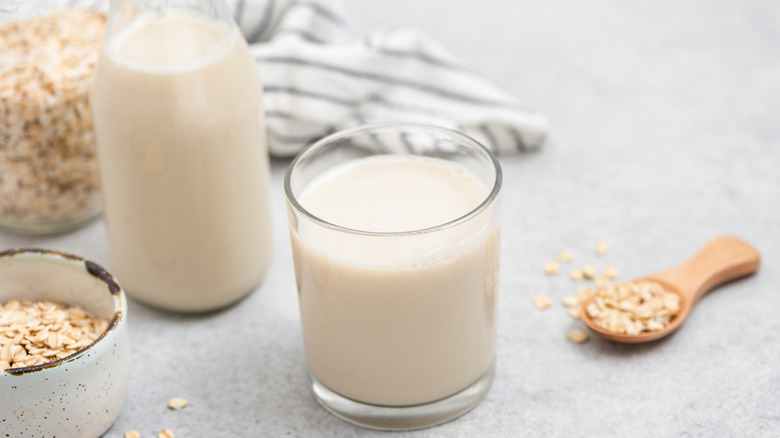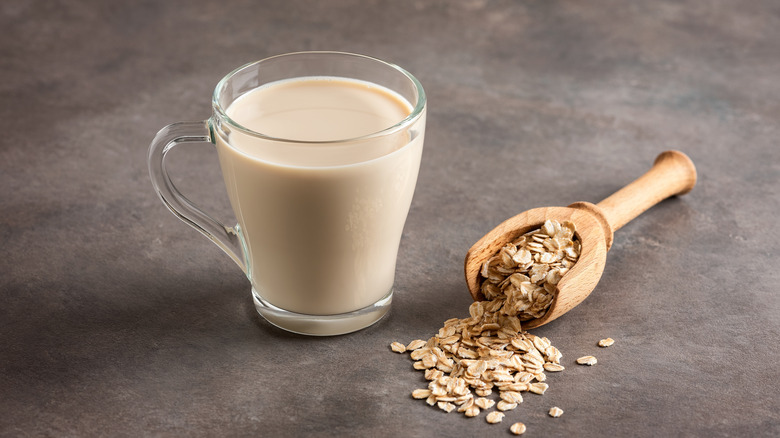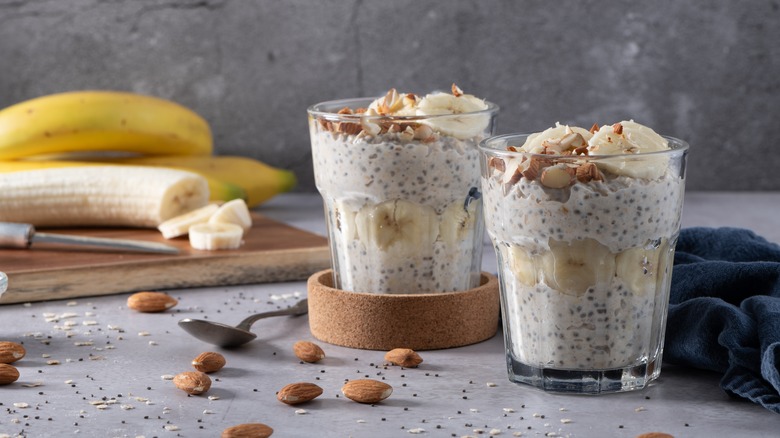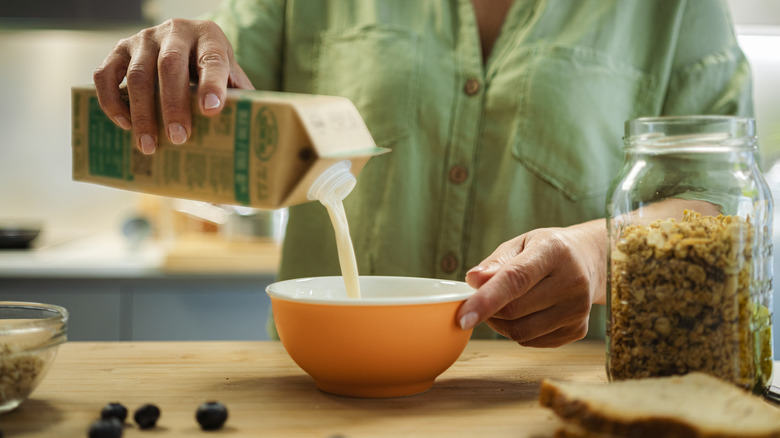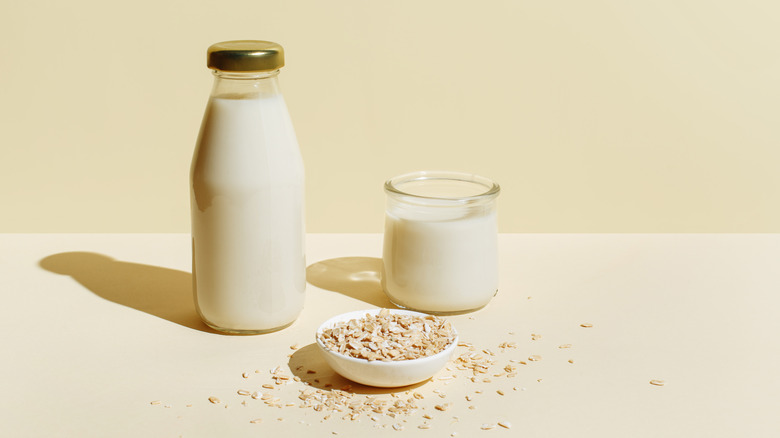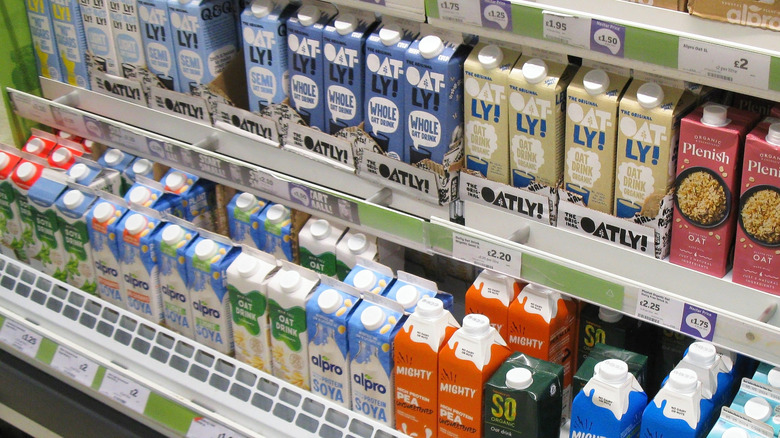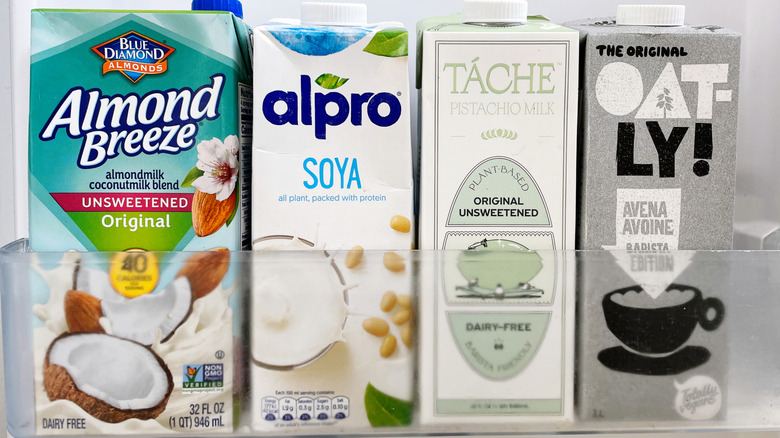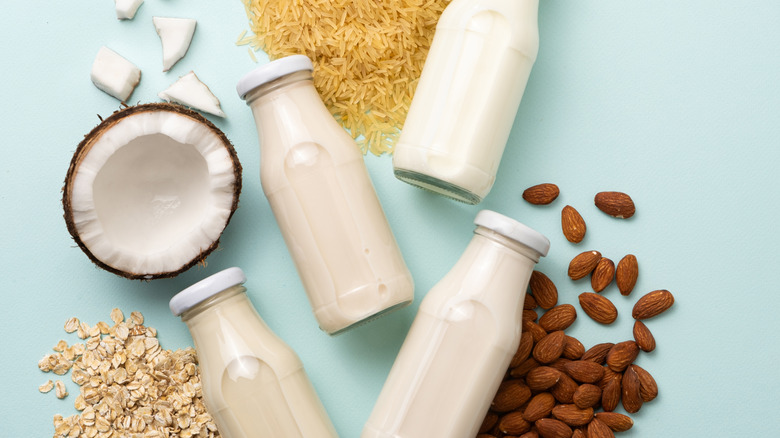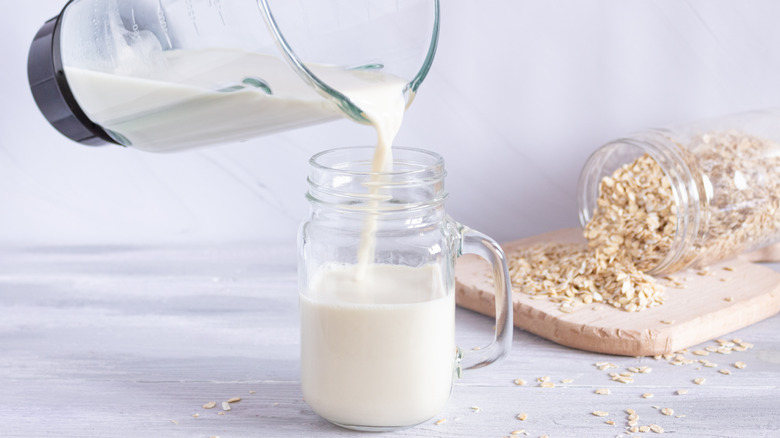False Facts About Oat Milk You Thought Were True
It seems like everyone's drinking a different alternative milk these days, with dairy becoming a relic of the past. As an oat milk drinker, I consider it the best choice among the nondairy options and it's gaining in popularity, too, set to knock almond milk off the top spot. Still, there's lots of misinformation about oat milk. Most of us probably believe something about it that isn't true. And it might be putting you off drinking it.
Some people believe incorrect information about the nutritional value of this nondairy milk that could make them think twice about drinking it. For instance, that it's all starch without any nutrients or that it contains unsafe additives. Others believe more innocuous misconceptions, like it doesn't last long once you've opened it or you can't make good latte art with it. But we want to uncover the truth.
So, come armed with your oat milk myths and we'll bust them. We're not saying that everyone should drink it or that it's undoubtedly the best milk alternative around. But we want to sort fact from fiction and uncover some interesting information in the process. These are some of the false facts about oat milk you thought were true and the reality behind them.
False: You can't even call it milk
You might have heard that you can't officially call oat milk "milk", but this isn't true — at least in the United States. Although the dairy industry has tried to prohibit the use of the word milk to refer to oat milk and other nondairy milks, it's currently still allowed. And we think it makes sense — after all, nobody's going to think oat milk comes from cows just because it has "milk" in the name.
In 2023, the FDA ruled that plant-based milks can legally be called milk on the packaging and in advertising. They did make a suggestion that makers of nondairy milks should put a nutritional comparison to their dairy counterparts on the labels but this is currently voluntary. However, in much of Europe, using the term "milk" is against the law. Instead, it's generally called "oat drink."
But other nondairy products are referred to as milk, such as coconut milk, so why come after oat, soy, or almond? The answer is profit. The dairy industry is concerned about falling profits and wants to take it out on the manufacturers of nondairy versions. There's a flaw in that logic, though. People are still going to buy oat milk even when it's called oat drink.
False: There's not enough protein in oat milk
One common misconception is that there's not enough protein in oat milk, but this isn't strictly true. Sure, it doesn't contain as much protein as dairy milk. Most people get more than enough protein, so the amount found in milk doesn't make much of a difference.
On average, oat milk has around 3 grams of protein per cup. Cow's milk has a bit more than twice as much — just under 8 grams per cup. But most adults don't consume huge quantities of milk each day, so this difference is pretty negligible. What's more, you might be less in need of protein than you imagine.
Although it varies depending on body weight, the average American adult needs between roughly 60 grams and 70 grams of protein each day. The official calculation is 0.36 grams per pound of body weight each day. However, most folks end up eating significantly more than that. In the U.S., men tend to exceed their recommended daily intake of protein by 31% and women by 12% (as is often the case, this data excludes anyone outside the gender binary). So, a lot of people are eating significantly more protein than they need. This means that losing a few grams here and there from using oat milk over dairy could be a good thing, rather than a bad one.
False: Oat milk is nothing but starch
Despite what you might have heard, oat milk isn't just starchy water. This plant-based milk actually packs quite a nutritional punch, though it's different from dairy milk. So, don't let people tell you it's devoid of goodness.
What's more, as we already discussed, an average oat milk contains about 3 grams of protein per cup. Oats naturally contain high-quality protein with all nine essential amino acids your body needs. The carbohydrates in oat milk aren't empty calories either. They come from whole grain oats, which provide fiber and complex carbohydrates that give you steady energy. One cup contains around 2 grams of fiber, which helps with digestion, keeps you full, and plays a part in regulating blood sugar.
Many brands fortify their oat milk with important nutrients. You'll often find calcium, vitamin D, vitamin B12, and iron added in amounts similar to dairy milk. This makes it a good choice for people who need these nutrients but can't or don't want to drink cow's milk.
The fat content in oat milk is mostly healthy unsaturated fat, unlike the saturated fat found in whole dairy milk. Some brands add extra heart-healthy oils like sunflower or canola oil. It's also lower in calories than cow's milk, which isn't inherently good or bad but is a factor that some consider when buying.
False: Oat milk causes problematic blood sugar spikes
Here's another false fact that it's time to debunk: oat milk causes problematic blood sugar spikes. The truth behind it is that all food can raise your blood sugar — this is normal and something that isn't a problem for non-diabetics. What's more, this nondairy milk doesn't raise blood sugar significantly, anyway.
Oat milk has more carbohydrates in it than dairy milk does. And carbs are transformed into glucose by the body, which can lead to a rise in blood sugar. But this is the case with many foods. Anyone with a healthy pancreas — usually people without diabetes — can deal with this. The pancreas produces insulin and regulates your blood sugar. It's not an issue. Besides, oat milk might be more carb-heavy than cow's milk, but it's not like drinking a sugary soda. It has a medium glycemic index (GI), which essentially means it's pretty neutral for blood sugar. It's not especially good for it or especially bad for it.
The other thing to remember is that it's higher in fiber than cow's milk and contains a moderate amount of protein. Fiber, protein, and fat can all reduce the amount your blood sugar raises after eating by slowing down your body's glucose absorption.
False: You don't get enough vitamins and minerals from drinking oat milk
Some people say that you don't get enough vitamins and minerals from drinking oat milk, but this simply isn't true. The fact is that almost all oat milk is fortified. This means it has vitamins and minerals added to it, making it more nutritionally sound and helping it compete with dairy milk
Most oat milk brands add calcium, which your body needs for strong bones and teeth. In most cases, they aim to match the calcium content of dairy milk, though exact amounts vary between products. You'll often find vitamin D added, too, since it helps your body absorb and use calcium properly.
Vitamin B12 is another common addition to oat milk. This vitamin is crucial for making red blood cells and keeping your nervous system healthy. Since B12 only comes from animal products, this fortification helps people on vegan diets, although supplementation is recommended, as well.
Many companies also add iron to their oat milk. Iron helps carry oxygen throughout your body and prevents anemia. Again, it's a helpful nutrient for vegans, as well as vegetarians. Less commonly, you might find iodine in oat milk, which is another nutrient particularly lacking in vegan diets. This fortification means that people who forgo dairy aren't missing out on what their body needs.
False: Oat milk contains unsafe additives
People often worry about unfamiliar ingredients in their food. In the case of oat milk, some people claim that the added canola oil and dipotassium phosphate are dangerous and should be avoided. But these additives are actually safe.
Dipotassium phosphate might sound scary because of its chemical name, but it's simply a naturally occurring mineral salt. It's added to oat milk as a stabilizer to prevent separation. If you've ever had nondairy milk curdle in your coffee, you'll understand why. Your body already processes phosphates every day from natural food sources like nuts, beans, and dairy products. The small amount in oat milk won't harm you unless you have kidney disease and need to limit phosphates. In fact, it contains a decent amount of phosphorus you need in your diet.
Canola oil also gets a bad rap, but there's nothing wrong with it. Food companies add it to oat milk to improve texture and add healthy fats. Despite what you might read online, canola oil is low in saturated fat and high in heart-healthy omega-3 fatty acids, so it's actually good for you, not bad. It comes from specially bred rapeseed plants and undergoes careful processing to remove any harmful compounds. So, there's really no need to worry about any oat milk additives.
False: All oat milk is basically the same
If you think that all oat milk is essentially the same, you've fallen for a common misconception. Treating all oat milk as identical ignores the differences in their ingredients and quality. This is different from cow's milk, which is fairly similar and the differences are down to fat content and are clearly labeled. It's easy to tell the difference between skim milk and 2%, for instance, while it's trickier to tell oat milks apart.
The big difference is in the ingredients. Some have simple ingredients, containing nothing but oats, water, and salt. This might seem great but you actually want all those added vitamins and minerals. Plus, versions with oils are richer and creamier than those without. Added sugar is another thing to look out for. While we wouldn't say you should always avoid oat milk with added sugar, oats are naturally sweet so you might find the flavor perfect without sugar.
Then, there's the general difference in quality. We ranked popular brands of oat milk from worst to best and there is a significant variation in taste, texture, and creaminess. This is hard to quantify, however, so you might need to try a few brands to find your favorite.
False: Oat milk doesn't last long after opening it
You might have heard that oat milk doesn't last long once you open it. This may put you off buying a carton because you're worried it will go to waste. This can be a particular issue if you live alone or you're the only one in your household drinking oat milk. However, the truth is that it lasts longer than you might assume.
So, how long does oat milk last in the fridge? Officially, this varies between brands. You can check the package for more information. We've generally found that oat milk lasts around seven to 10 days in the fridge. I routinely keep oat milk for well over a week, sometimes close to two, rarely finding that it goes off before I finish the carton.
Once you get over the seven day mark, it's good to check your oat milk before using it. You'll usually notice if the smell isn't right. Oat milk that's gone off can smell sour or at least notably different from its usual oaty, nutty aroma. You can also pour a little out and look at it. When it's off, it gets lumps in it and goes slightly yellow — so it's not hard to tell when it's time to toss it in the trash.
False: Oat milk is basically interchangeable with any other nondairy milk
Many people treat every nondairy milk as basically interchangeable with one another. But this is based on some false assumptions. While you can, of course, switch oat milk with almond or soy, you can't expect the exact same flavor and texture. Each has its own distinct taste, some of which are better for certain dishes than others, and all have their own levels of richness and creaminess.
So, which plant-based milks are best for what? Oat milk has a relatively neutral flavor, so it works well in coffee and tea without changing the flavor too much from what you'd expect with cow's milk. It's a little sweet, however, so some versions aren't the best in savory dishes. Plus, it isn't the thickest and creamiest of all nondairy milks. Soy milk is particularly thick and creamy, so the unsweetened version is great for dishes like mac and cheese or béchamel sauce. It's also high in protein, which is good for anyone trying to consume more.
Almond milk is a popular choice with a nutty flavor that some people enjoy in coffee and hot cocoa. However, the nuttiness is prominent, so when you want a neutral taste, it isn't the best option. Hemp milk is great for those looking for complete proteins, as it contains every amino acid, plus it's rich in healthy fats. And those choices are just a few of many — there's a wide world of plant milks to explore.
False: Oat milk is hard to make from scratch
Make your own oat milk? Surely not. You probably assume it's difficult because why else would people buy it from the store? The truth of the matter is that it's actually super simple to make yourself from scratch. However, there are some disadvantages to homemade oat milk.
To make homemade oat milk you simply blend together oats, water, and a pinch of salt. Some people like to add sugar or honey for sweetness. You can also add vanilla extract, but this will rule out you using the milk for any savory dishes. You need about a cup of oats for every six cups of water, but ratios vary between recipes. After blending, use a cheesecloth or fine mesh strainer to remove any chunks — and that's it, you have oat milk.
If it sounds too good to be true, there are some downsides. It doesn't contain the stabilizers, so it's more likely to separate in coffee. Some people also dislike the texture compared to store-bought stuff, saying it's grainy or not creamy enough. The other factor is that it isn't fortified so the nutritional content is lacking compared to commercial versions.
False: There are limited ways to use oat milk
It's a common misconception that there are only limited ways to use oat milk. You might think it's good in coffee but not much else. Or perhaps you're just using it on your serial. However, the truth is that there are all kinds of sweet and savory recipes in which she can use oat milk.
If you're looking for something sweet, you might want to use oat milk in pancakes, cookies, muffins, or other baked goods. You can use it interchangeably in any recipe that calls for cow's milk. Plus, there are many savory recipes that you might use oat milk in. For instance, you could use it in a dairy-free mac and cheese, pies, soups, or chowders. As with sweet recipes, you can use oat milk in pretty much any recipe that asks for dairy milk. They act the same so there's no need to make any adjustments to the recipe.
You'll also find oat milk used in commercial products. For instance, there are oat milk salad dressings on the market recreating classic favorites like ranch and Caesar. You can also find oat milk chocolates which give you the creaminess of dairy without any cow's milk, among other commercial options.
False: Oat milk doesn't steam well for latte art
If you've heard that oat milk doesn't steam well for specialty drinks and making latte art, you're mistaken. It's an excellent choice for this. In fact, it's one of the easiest nondairy milks to steam and froth. It has a similar texture to dairy milk when steamed, developing a rich, velvety microfoam that holds its shape well. This makes oat milk a dream to work with for baristas crafting beautiful latte designs.
Many oat milk brands even make special "barista editions" formulated specifically for steaming. These versions have an extra creamy consistency that froths up beautifully. The microfoam they produce mimics dairy milk, letting you create detailed latte art.
Compared to other plant-based milks, it's an excellent choice. Part of this is that you can work with it in the same way you would cow's milk. With other nondairy offerings, you have to treat them slightly differently, working to different temperatures and introducing steam earlier in the process to get even vaguely comparable results. This means there's more of a learning curve for baristas who are used to working with dairy.
False: Oat milk always curdles in coffee
If you're someone who regularly drinks nondairy milk, you've probably noticed that it can curdle in coffee. Some people may tell you that oat milk always curdles in coffee, but it's not the case. Oat milk is in fact one of the least likely plant-based milks to curdle in hot drinks, but it does happen.
The reason that oat milk curdles in coffee is to do with the acidity of the coffee compared to the pH level of the oat milk, as well as the temperature difference between the two liquids. But you can do these things to prevent curdling: either let the coffee cool slightly before adding the milk or heat the milk up slightly so there's less temperature difference. Another thing that can help is to choose less acidic types of coffee. However, some people prefer this kind of flavor profile and wouldn't want to make that change. So, don't assume that oat milk will always curdle in your coffee, but be prepared that it might on occasion.
